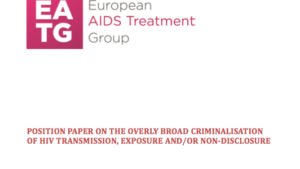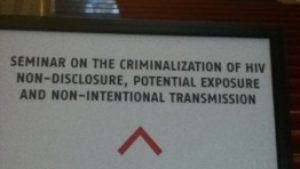Overview
The Netherlands became one of the first countries in the world to apply the science of HIV to the criminal law, essentially decriminalising everything except intentional HIV exposure or transmission. Prior to this, between 1989 and 2005, there were at least 15 convictions for alleged HIV exposure or transmission using laws relating to assault, causing bodily harm and manslaughter.
In 2005, two rulings by the Supreme Court changed the Dutch approach to use of the Criminal Code. The first cases related to an HIV-positive man who had engaged in receptive oral and anal sex. The second case related to an HIV-positive man who had engaged in condomless oral and anal sex with two minors, aged 13 and 16, using force on one occasion. Lower level decisions had been based on a general understanding that the HIV in itself constitutes grievous bodily harm as it allowed no prospect of a full cure and lifelong medication with various side effects. The Supreme Court disagreed.
Under Dutch law, a charge of grievous bodily harm requires the establishment of ‘conditional intent’. Conditional intent includes three elements, one of which is that there must be a ‘considerable chance’ of HIV transmission. The court decided that the issue of ‘considerable chance’ required consideration of the facts, including scientific evidence on transmission risk. The court took into account the nature of sexual contact, the presence/absence of other sexually transmissible infections, the number of sexual acts, and the fact that antiretroviral therapy leads to a decline in viral load, making it less likely HIV can be transmitted. In the first case, the accused was found not guilty. In the second, the accused was acquitted of attempted manslaughter and attempted aggravated assault but convicted of rape.
The Supreme Court decision left it open for the Government to decide whether or not to enact an HIV-specific law. During this period, the Dutch Executive Committee on AIDS Policy and Criminal Law published a groundbreaking report, Detention or Prevention?, analysing the impact of the use of the criminal law on public health and the experience of living with HIV. That report played a significant role informing discourse of on HIV criminalisation issues at national level, with the Government persuaded that an HIV-specific criminal law was neither required nor useful.
Since 2005, the only known criminal (and subsequently civil) proceedings relates to a notorious case involving three men accused of drugging, raping and deliberately injecting HIV-positive blood into 12 men at private sex parties in Groningen. Notably, in 2008 the lower court ruled that there was no proof that the accused had transmitted HIV because it was impossible to prove that the men did not have HIV before attending the sex parties. Consequently, the accused were convicted of attempting to cause grievous bodily harm, rape and charges relating to injecting. The men were jailed for terms of nine years, five years, and three and a half years, respectively.
The case was appealed to the Leeuwarden Court of Appeal which, in 2010, reversed the lower court’s finding on causality, finding two of the men guilty of intentional grievous bodily harm, increasing the sentences to 12 and nine years respectively. That decision was appealed to the Supreme Court which, in March 2012, decided the case should be retried, because there was reasonable doubt that the men acquired HIV by being injected with HIV-infected blood and, as the lower court originally found, they may have acquired HIV through unprotected sex.
Laws
Criminal Code 1881 (amended 2012) ss 300 - 303
Assault
Section 300
1. Assault shall be liable to a term of imprisonment not exceeding three years or a fine of the fourth category.
2. If the offence results in grievous bodily harm, the offender shall be liable to a term of imprisonment not exceeding four years or a fine of the fourth category.
3. If the offence results in death, the offender shall be liable to a term of imprisonment not exceeding six years or a fine of the fourth category.
4. The intentional harming of health shall be considered as equivalent to assault.
5. An attempt to commit this serious offence shall not be punishable.
Section 301
1. Assault committed with premeditation shall be liable to a term of imprisonment not exceeding four years or a fine of the fourth category.
2. If the offence results in grievous bodily harm, the offender shall be liable to a term of imprisonment not exceeding six years or a fine of the fourth category.
3. If the offence results in death, the offender shall be liable to a term of imprisonment not exceeding nine years or a fine of the fifth category.
Section 302
1. Any person who intentionally inflicts grievous bodily harm on another person shall be guilty of aggravated assault and shall be liable to a term of imprisonment not exceeding eight years or a fine of the fifth category.
2. If the offence results in death, the offender shall be liable to a term of imprisonment not exceeding ten years or a fine of the fifth category.
Section 303
1. Aggravated assault committed with premeditation shall be liable to a term of imprisonment not exceeding twelve years or a fine of the fifth category.
2. If the offence results in death, the offender shall be liable to a term of imprisonment not exceeding fifteen years or a fine of the fifth category.
Section 304
The terms of imprisonment prescribed in sections 300-303 may be increased by one third:
1°. if the offender commits the serious offence against his mother, his legal father, his spouse, his 129 partner, his child, a child over whom he exercises parental authority or a child whom he cares for or raises as part of his family; 2°. if the serious offence is committed against a civil servant during or in connection with the lawful performance of his office; 3°.if the serious offence is committed by administering substances harmful to life or health.
Further resources
A report on the impact of the use of criminal law on public health and the position of people living with HIV.
Acknowledgements
Our thanks to Australian law firm Hall & Wilcox their assistance confirming current relevant legislation.
HIV Justice Network's Positive Destinations
Visit the Netherlands page on Positive Destinations for information on regulations that restrict entry, stay, and residency based on HIV-positive status, as well as access to HIV treatment for non-nationals.




